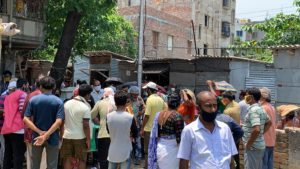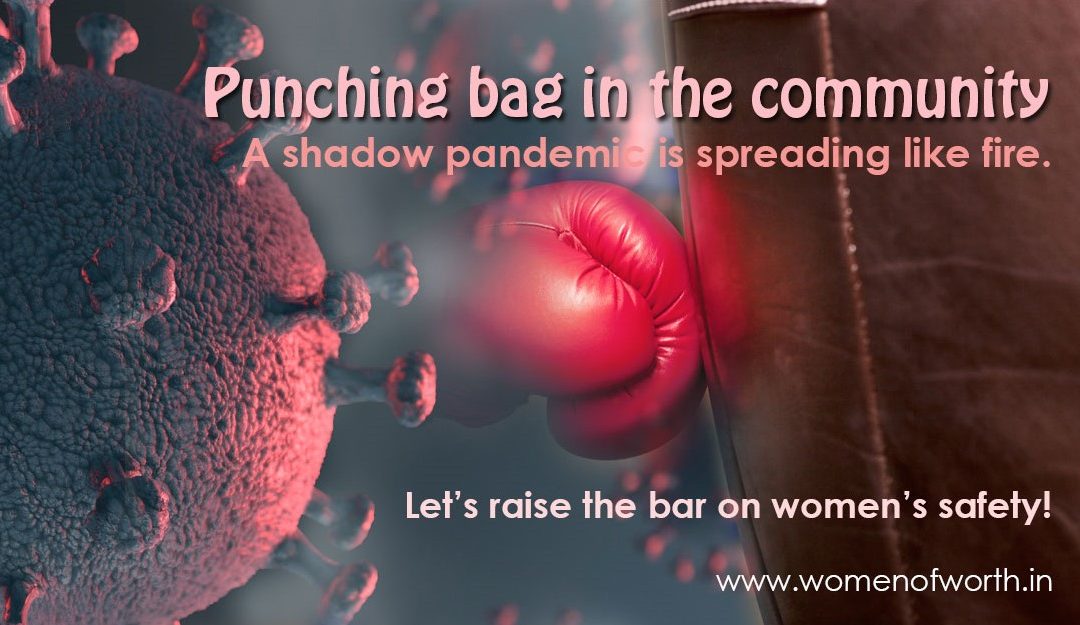When we all first started hearing about COVID-19 we assumed that it would not be ‘our’ problem. It was ‘their’ problem. The reality hit the country at the end of March, with the lockdown in place. While some of us were thinking of ‘being safe’ in the comfort of our homes there was a segment of society that didn’t know what safety meant. They didn’t know how to get the next meal for themselves. In the middle of a busy city like Kolkata with millions of people, in the north lies a community of about 44,000 people who are daily wage labourers, domestic help, rickshaw pullers and garbage cleaners. They are the people who make our lives comfortable.
WHO ARE THE PUNCHING BAGS?
With the people of the community losing their income and their future looking bleak, there was an increase in frustration, hopelessness and anxiety among the people. One of the biggest issues in our nation is the fact that only some of us have access to the legal remedial and to justice. There are millions of people in our country who are far away from receiving access to justice or even legal help.
It was during this time that the WoW team in Kolkata was able to connect with some of the city authorities. The team assured them that they were available to stand by the authorities to help during the time of crisis.
Very quickly this community was introduced to the WoW team. The team was told that it would be a difficult place to work at and would be uncomfortable. We were ready for the challenge.
When we first walked into the community it was indeed something words couldn’t have prepared us for. The houses were crowded- on top of each other literally.  There was no sense of lockdown being executed and there were people everywhere. There was no space for social distancing in the area. There was a feeling of hopelessness and sadness in the air. We quickly befriended the political leaders in the area and worked alongside them to reach out to the women and children. We were given a little shack in the middle of the vegetable market where we could station ourselves and wait for the women who would come to buy their daily groceries to find us and speak with us. We were immediately asked to intervene in some of the cases that were happening in the community and help with the problems.
There was no sense of lockdown being executed and there were people everywhere. There was no space for social distancing in the area. There was a feeling of hopelessness and sadness in the air. We quickly befriended the political leaders in the area and worked alongside them to reach out to the women and children. We were given a little shack in the middle of the vegetable market where we could station ourselves and wait for the women who would come to buy their daily groceries to find us and speak with us. We were immediately asked to intervene in some of the cases that were happening in the community and help with the problems.
The very first intervention was for a 25- year old lady who was married for about 8 months. Her in laws wanted a dowry of Rs. 2,00,000 but the family was only able to give Rs. 1,80,000. The in laws were not happy with the amount and she was continuously raped by her husband and many times by her father in law as well. On the day we were called, there was some major issue that had happened and the in laws set her on fire. We immediately assisted in getting her transferred to the hospital, being with her late in the evening to ensure she knew there was someone for her.
She was burnt 60% and it was a long and hard few days of battling for her life. We stood with her and helped in getting the statements to law enforcement. Unfortunately, she didn’t live to see justice done.
It was not easy to see her dying right in front of us and we wished there was a different end to her story and her life. She didn’t know she could have received justice for herself since her fight was for survival.
In another instance a 19-year old girl from a Hindu family ran away from home and got married to a 22-year old boy from a Muslim family. There was a lot of tension in the home because of the different faiths. The boy’s family, specifically his mother, would often beat the girl, since she didn’t accept her being from another faith. She was three months pregnant when her mother in law took her to someone in the mosque who looked at the girl and said she was pregnant with a girl child. The mother in law wanted a boy and therefore the severity of the abuse increased. When it got out of control, she ran out of the house to look for help and lost the baby the same night. She didn’t have the security to return to her parental house because they wouldn’t accept her back. We helped in counselling her, standing with her in the hospital, seeing the still born baby and sending the baby for cremation. We were there to support her, so that she knew she wasn’t alone especially when her own family despised her. She chose to return back to her in laws and continue to stay with her husband. She had no complaints against them. She didn’t want to go to the police or resort to any legal action since her survival and security of family and home was more important than fighting for her rights and for justice. We have continued to stand with her to ensure her safety and protection.
In another case, under the influence of alcohol, a girl from the same community was being beaten up by her husband. When we reached, we saw her dripping in petroleum and had we not intervened she would have been burnt alive. We were able to remove her and repatriate her back to her house in Sunderbans. It was a 4-hour long journey to take her back home by road and then crossing over the river in a boat.
Unfortunately, she was not safe in the maternal house either. We are unsure of the details of what happened, but it’s most likely that she was beaten, abused and died a couple of days later.
We couldn’t return back to help her because of the approaching cyclone and all communication on the Bay of Bengal was interrupted. Where was her justice? Did she really need a functional system or people to just be there for her?
What was common for all of the three women was that they needed basic security. They needed to know they are more important than dowry, than the child they would give birth to and that their lives mattered. They needed people to come and stand with them, affirm their worth and teach them that they had a right to life and dignity.


